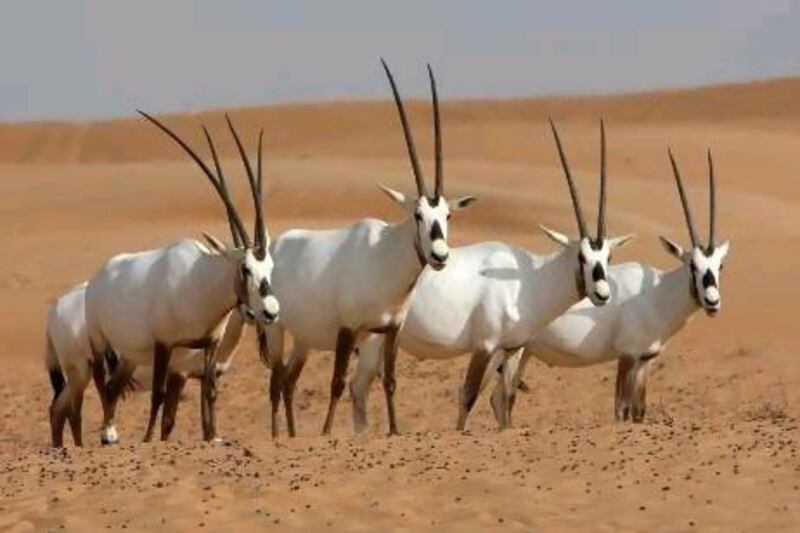DUBAI // New mating partners are needed for the nation's private oryx herds if they are to survive the ticking genetic bomb created by inbreeding, experts warn.
Many privately owned herds in the Emirates come from a limited gene pool, which potentially leaves them open to infections, declining fertility and premature death.
In a paper published in the Conservation Genetics journal last month, researchers said there was a "genetic bottleneck" developing in some large captive herds in Abu Dhabi.
"In zoos in the West, there was very intensive management, where every single mating was controlled and logged," said Rob Ogden, a co-author of the report. "In theory, the pedigree was well known.
"In the UAE, historically that didn't happen. You split them up into lots of different collections and they had unmanaged breeding."
When officials reintroduced oryx into the wild in the Umm Al Zamool region of the Empty Quarter of Abu Dhabi in 2007, they selected animals from many different collections across the country.
Dr Ogden, a researcher at the Royal Zoological Society of Scotland, said genetic diversity in the herd there was far healthier than in private herds in Sir Bani Yas and Al Bahia.
The issue is especially pressing as the UAE has around 50 per cent of the world's population of oryx, which up until last year was listed as endangered by the International Union for Conservation of Nature.
"It would be better to try and manage the private collection breeding a bit more closely, especially those which started with a small number of animals," said Dr Ogden, who worked closely with the Environment Agency-Abu Dhabi on the research.
"There should be some exchange of animals from among private collections in order to improve diversity.
"With genetic diversity it's not so black and white. That makes it difficult to make definite statements or raise alarm bells.
"But it's a ticking bomb. Unless you manage diversity very carefully you're going to end up with problems."
Declan O'Donovan, the director of wildlife services at the Wadi Al Safa Wildlife Centre in Dubai, said that the problem was first noted about 10 years ago. At the reserve he manages, which has around 300 Arabian oryx, there is a constant effort to improve diversity.
"We have brought in founders from different places to make sure our populations are pretty diverse," he said. "We have had some from Europe, Jordan and also from other collections in the UAE. We have been managing them pretty carefully."
He said herds with a low genetic diversity were far less resistant to novel infections, and also demonstrated a drop in fertility.
"If they aren't managed properly, then it could be a threat to the herd," he said.






